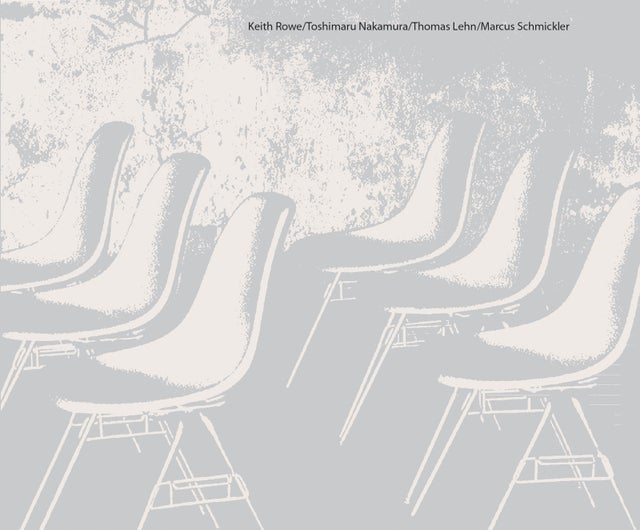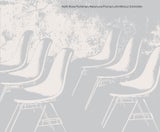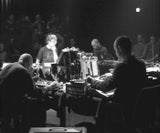- Thomas Lehn
- >
- Keith Rowe / Toshimaru Nakamura / Thomas Lehn / Marcus Schmickler (CD)
Keith Rowe / Toshimaru Nakamura / Thomas Lehn / Marcus Schmickler (CD)
SKU:
$14.00
$14.00
Unavailable
per item
ErstLive 002
Live improvisation by Keith Rowe and Burkhard Beins. Recorded by WDR on May 8, 2004 at Stadtgarten, Cologne, Germany as part of AMPLIFY 2004: addition. CD in slimline packaging, with a photo of the concert inside.
For lossless (16/44) files, go to this page.
Live improvisation by Keith Rowe and Burkhard Beins. Recorded by WDR on May 8, 2004 at Stadtgarten, Cologne, Germany as part of AMPLIFY 2004: addition. CD in slimline packaging, with a photo of the concert inside.
For lossless (16/44) files, go to this page.
|
TRACK LIST
1. Untitled (38:47) (released November 1, 2004) CREDITS
Keith Rowe: guitar, electronics Toshimaru Nakamura: no-input mixing board Thomas Lehn: analogue synthesizer Marcus Schmickler: synthesizer, computer recorded on 8 May 2004 at Stadtgarten, Cologne as part of AMPLIFY 2004: addition |
ErstLive is a new series of releases from Erstwhile Records, documenting notable live sets associated with the label. The discs are designed to simulate a concert experience, each in the same template design using two colors chosen by the musicians involved, with a photo of the concert on the back cover. Each will be in an edition of 800 CDs and not reprinted. The initial releases will be chosen from the AMPLIFY 2004 festival which took place in Cologne and Berlin in May 2004.
ErstLive 002 is from the quartet of Keith Rowe, Toshimaru Nakamura, Thomas Lehn and Marcus Schmickler, the final quartet performance in the Cologne half of AMPLIFY 2004: addition, also in May 2004. This was the quartet's first performance together. REVIEWS
Signal To Noise, Jason Bivins The prolific Erstwhile label has been at the forefront of electroacoustic improvisation - or simply eai - for several years running. Live recordings have been a staple of Jon Abbey's brainchild since the beginning - as is often the case with improv music, which lives for those coalescences of intense moments - but recently the label has been documenting live music more intensely. Abbey has curated several festivals under the AMPLIFY moniker, one resulting in a box set and one yielding the first four releases of the Erstlive imprint. The Erstlives are semi-regular releases documenting concert recordings, released in a slimline case with a distinctive and consistent graphic style. These festivals like to mix things up, bringing together new configurations of players from the fast-moving scenes feeding into this music or throwing monkey wrenches into relatively settled lineups. On these first four recordings, we get to listen to both approaches, and the results are fantastic. Each of these releases is a document of the May 2004 AMPLIFY: addition festival in Köln and Berlin, with co-curator Keith Rowe (guitar and electronics) featured on the first two releases. The second document puts the spotlight on a meeting between two duos who have recorded separately for Erstwhile. Thomas Lehn (analogue synth) and Marcus Schmickler (digital synth) recorded the raucous BART (followed later by Rabbit Run, adding Rowe), while Rowe and Toshimaru Nakamura (no-input mixing board) waxed the sublime Weather Sky. What's so surprising about this quartet is the way in which the quiet fire of the latter duo is able to blend with the rather explosive tendencies of the former. This isn't to say that the respective duo tendencies don't surface somewhat regularly; they do indeed, and that accounts in many ways for the performance's freshness and its ability to resist the gentle tug of familiar improvisation pathways or customary means of developing the music. When the synthesizers interject with a raucous bleat or when the gravity of Rowe and Nakamura pulls the sound back into itself, you'll certainly recognize the distinctiveness of the combinations in question (while elsewhere it's damned difficult to tell who's responsible for that odd sizzle, rustle, or whine, though the brief mangled fragment of "Happy Jack" is surely Rowe's doing). In other words, the four players don't empty themselves of personality or inclination in order to contribute to a safe formula; instead of a common denominator form, we get a compelling dialogue between two (or is it four) distinct parts. It's the communicative exchange and dialogue that is itself the character of this improvisation. |



